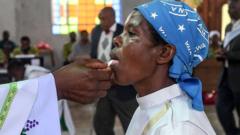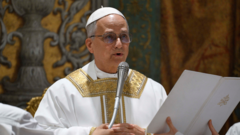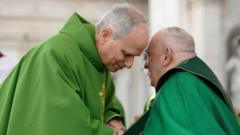As the Catholic Church witnesses significant growth in Africa, discussions are increasing regarding the election of a new Pope from the continent. While some argue it's time for African leadership, others caution against tokenism, stressing the need for a strong candidate irrespective of origin.
Could the Next Pope Emerge from Africa?

Could the Next Pope Emerge from Africa?
The possibility of an African Pope is gaining attention as the Catholic Church's demographic shifts.
If the growth trends of the Catholic Church serve as a decisive factor, it stands to reason that the next Pope may emerge from Africa. The continent boasts the fastest increase in Catholic population, accounting for over half of the global growth. Although there have been three popes of African origin in the past, with the last being Pope Gelasius I more than 1,500 years ago, many believers advocate for fresh leadership that mirrors the Church’s global congregation.
Father Stan Chu Ilo, a Nigerian priest and academic, highlighted this sentiment during discussions about the future leadership of the Roman Catholic Church. He believes an African Pope could provide a much-needed reflection of the Church's growing demographic, although he acknowledges that the cardinals who are set to vote on the next pope may lean towards selecting a prominent figure rather than an underrepresented candidate.
The lack of senior African clergy in influential positions within the Vatican is a significant challenge when it comes to electing an African Pope. Unlike in previous decades, when figures like Ghanaian Cardinal Peter Turkson and Nigerian Cardinal Francis Arinze were prominently considered candidates, the current pool lacks a standout African representative in global Catholicism. Pew Research Center data shows that Pope Francis has increased the percentage of sub-Saharan cardinals from 8% to 12%. Nevertheless, this is not sufficient for a significant influence in the upcoming conclave.
Father Paulinus Ikechukwu Odozor, a professor at Notre Dame University, cautioned against the notion that an African Pope is solely warranted due to the continent's growing Catholic population. He articulated that the role of the Pope transcends geographical borders, emphasizing that significant theological knowledge should be paramount in choosing the next leader. The representation of African issues within Vatican decisions must also improve to ensure that African voices matter.
Pope Francis has received recognition for his efforts to foster peace and advocate for marginalized communities in Africa. His approach has resonated with many, especially in countries like the Democratic Republic of Congo, where he condemned the exploitation of natural resources. However, he has faced backlash in Africa for his stances on LGBTQ+ issues, leading to tensions with bishops who resist changes reflecting Western liberal perspectives.
As potential candidates like Cardinals Turkson, Robert Sarah, and Fridolin Ambongo Besungu continue to navigate complex cultural norms surrounding social issues, the overarching sentiment among African clergy remains focused on the necessity for genuine influence rather than superficial representation. Despite the number of African cardinals increasing, the consensus among observers suggests that ingrained challenges, including issues of racial bias, could hinder the acceptance of an African Pope.
Eventually, while a significant portion of the voting cardinals appointed by Pope Francis may advocate for a leader rooted in compassion and grassroots outreach, as in the spirit of a “poor-first” approach. The unpredictability of such an election remains high. As Father Chu Ilo noted humorously, the best one can do in such uncertain times is to pray for direction from above.





















